Def Leppard’s Vivian Campbell and Phil Collen on writing rock for a stadium audience and learning from ‘80s spandex cringe
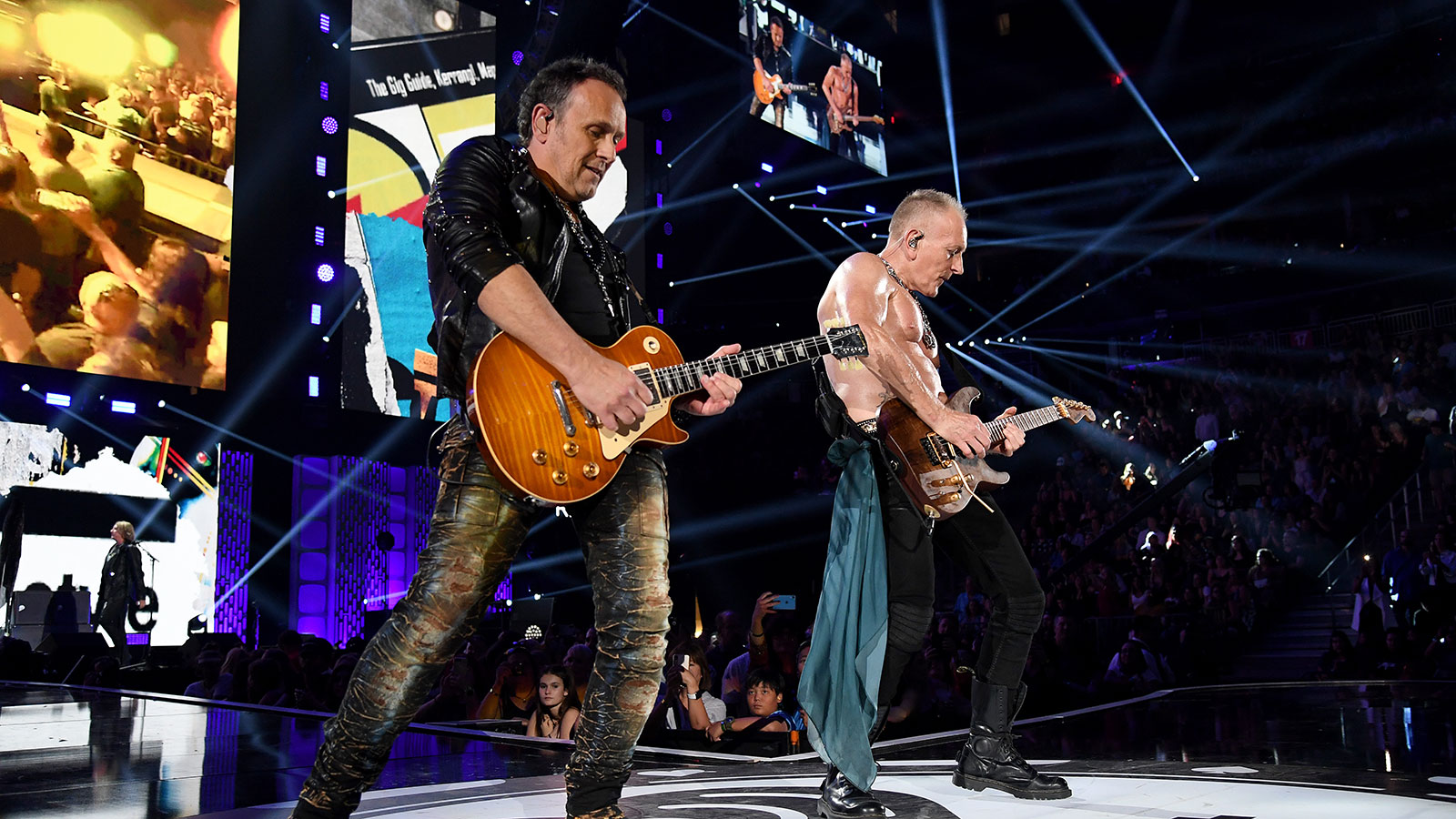
It wouldn’t exactly be an understatement to say that the Covid pandemic threw a king-sized monkey wrench into Def Leppard’s plans.
In June 2020, with just two weeks before the band was about to embark on a 30-date stadium tour that would also feature Mötley Crüe, Poison and Joan Jett and the Blackhearts, the group was forced to reschedule the entire run for the following summer.
Nearly a year later, however, with Covid cases continuing unabated, the band announced that the rebooted tour was postponed yet again and would commence this year.
“Let’s face it – no band likes to cancel concerts,” says guitarist Phil Collen, “and obviously, Covid has been a shitty time for people all over the world. On that level, it is what it is. But to be honest, this is a band that’s been through a few situations that derailed us for a bit. We’ve learned how to handle those times and persevere. No matter what, we press on.”
Fellow guitarist Vivian Campbell echoes Collen’s sentiments: “It was very disappointing when we had to postpone those tours, but here we are now. We’ve got the places booked, and we’re ready to go. We’re definitely playing this time.”
He adds, “There was something positive that came from it. The time off led to an opportunity for us to make a great album, so now we’re in a position to do a huge tour with a fantastic record to go with it. So it’s all good.”
The album Campbell refers to is Diamond Star Halos, Def Leppard’s 12th studio recording and their first in seven years. As the title suggests – it’s a pluralization of a lyric from T. Rex’s Bang a Gong (Get It On) – many of the songs contained in the set draw inspiration from the band’s early musical influences.
Get The Pick Newsletter
All the latest guitar news, interviews, lessons, reviews, deals and more, direct to your inbox!
To be sure, there’s an unmistakable Seventies glam-rock spirit on power rockers such as Kick, Fire It Up and Gimme a Kiss, and for good measure the band even enlisted David Bowie’s legendary Spiders from Mars keyboardist, Mike Garson, to perform on a pair of stirring ballads, Goodbye for Good This Time and Angels (Can’t Help You Now).
Notably, there are a couple of detours to modern-day Nashville – Alison Krauss turns up to duet with singer Joe Elliot on the country-laced poppers Lifeless and This Guitar – that don’t quite fit the sonic narrative, but they’re sparky pinwheels of hooks and standout cuts in their own right.
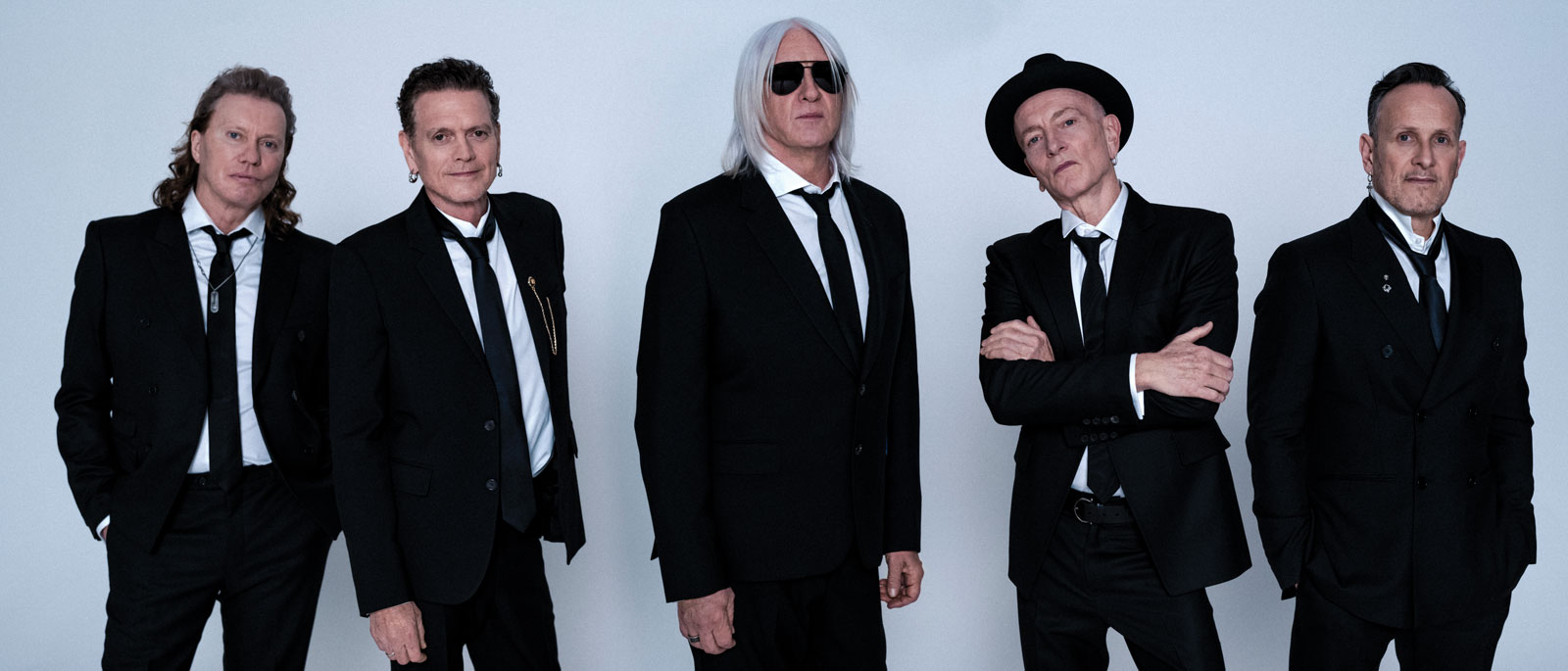
All in all, the album is the spunkiest and most vibrant sounding record the band has made in some time, a feat made even more remarkable considering the fact that it was recorded remotely during the high point of Covid lockdowns.
It was a trans-Atlantic endeavor, too, with longtime co-producer Ronan McHugh monitoring the flow of tracks coming in from various time zones: In the States, there were Collen, Campbell and drummer Rick Allen, while Elliot and bassist Rick Savage beamed their parts in from Ireland and the U.K., respectively.
“It really wasn’t as complicated or as difficult as it sounds,” Collen says. “We’ve made lots of records without us being in the same room at the same time.”
Recording separately is one thing; rehearsing for a tour is a different matter entirely. Unsurprisingly, the band is chomping at the bit to get going.
“We can’t wait,” Campbell says. “To tell you the truth, we’ve never left that headspace of being a touring band. We’ve got a lot of rehearsal time scheduled, but I have a feeling that after a few days, we’ll all be like, ‘Oh, yeah, here we go.’ It’s just like riding a bike, really.”
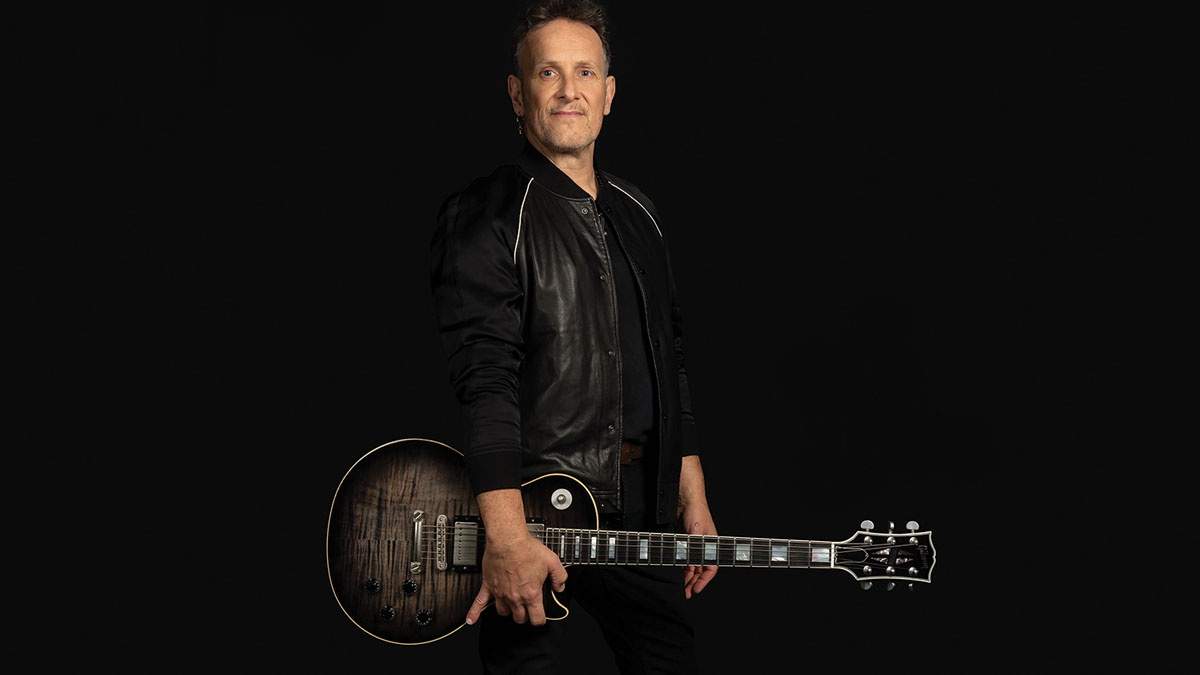
Let’s start with the T. Rex influence on Diamond Star Halos. As a guitarist, what did Marc Bolan mean to you guys growing up?
Vivian Campbell: “He started the ball rolling for me. It wasn’t Marc Bolan the guitar player per se; rather, it was the whole thing – his sound and image. He really was the grandfather of the glam rock movement; he had the hair and the androgyny, and of course, he made music that was such infectious ear candy.
“I was about nine years old when I first saw him on Top of the Pops. It was such a lightbulb moment where I went, ‘That’s what I want to do. I want to wear my sister’s clothes. I want to blow my hair and play guitar and make a living doing it.’”
You wanted to be that guy on the cover of Electric Warrior.
Campbell: “Yeah, exactly! He looked so great with his long hair and that Les Paul. That started me on the path. He just had the whole package, but the music was there. Out of that grew the different people who actually did influence me as a guitarist, like Rory Gallagher and Gary Moore. But I have to say, it was Marc Bolan who set me on my way to discovering them.”
Phil, how about you?
Phil Collen: “Oh, I thought Marc Bolan was amazing, but for me, it might have been more David Bowie, who was from the same time period. I saw Bowie on Top of the Pops with Mick Ronson playing his Les Paul. The way he held that thing, I was like, ‘My God, this guy is so fucking cool.’
“I was 14 and I was trying to identify myself. I’d already gotten into Deep Purple, Zeppelin and Hendrix, but then came Bowie, Bolan, Roxy Music, the Faces, but especially Bowie. That was the music that spoke to me.”

I was going to bring up Mick Ronson. How did he impact you?
Collen: “The thing about him was... well, there’s his solos. They were phenomenal and they were different, and you could hum them. Great tone and melody. He was the perfect foil for Bowie. He was also a great producer. Walk on the Wild Side by Lou Reed – that’s Bowie and Ronson producing. Mick Ronson had the whole thing as an artist; it wasn’t simply as a guitar player. As an entity, he was amazing.”
Mick Ronson had the whole thing as an artist; it wasn’t simply as a guitar player. As an entity, he was amazing
Phil Collen
There’s a thread here: Bolan and Bowie... and you use Mike Garson on a couple of tracks. Did you ever think about Tony Visconti as a producer? He’s the guy everybody has in common.
Collen: “Not really, especially when we know exactly what we want ourselves. And to be quite honest, if we’d have brought in a producer, he would have just gotten in the way. Ronan McHugh is like part of the band. Anyone else would fuck it all up. We know exactly what we want. If we brought in anybody else, they just wouldn’t get it.”
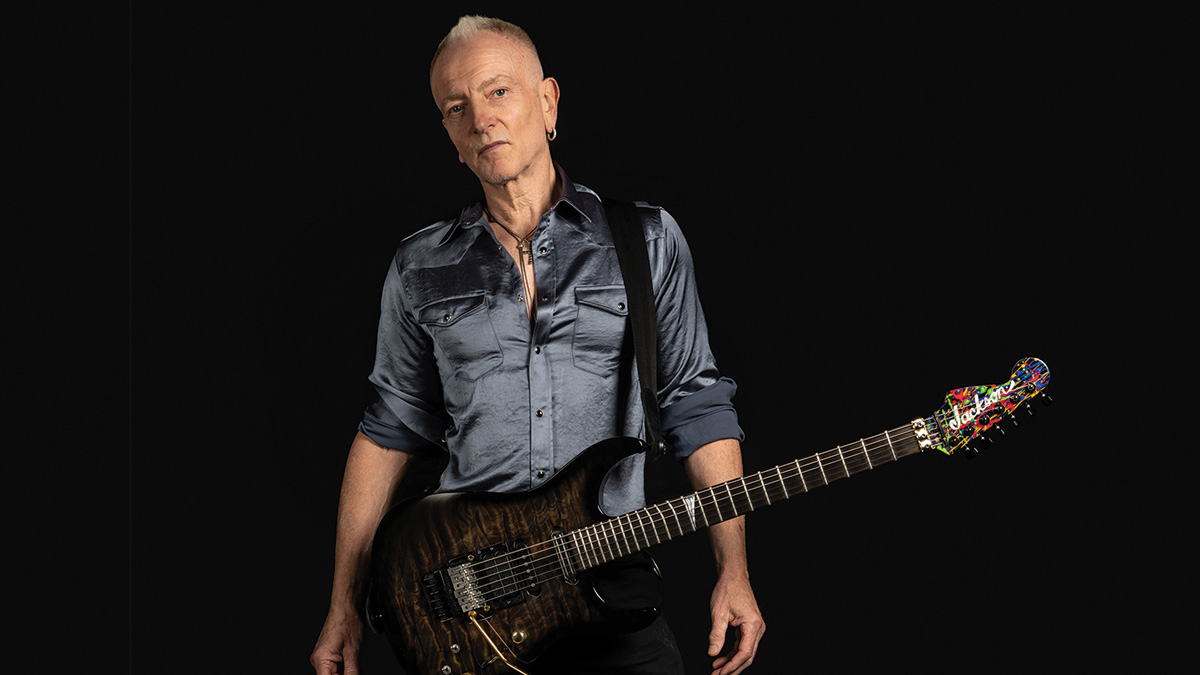
Phil, I understand that you wrote Kick late in the record-making process. Turns out, it’s the album’s first single. Did you think the record needed that one sure-fire song?
Collen: “Actually, that song and Fire It Up weren’t written for Def Leppard. Fire It Up was one of the first songs I wrote, and Kick was the last. The co-writer on Kick is a guy named Dave Bassett. I programmed a drum pattern because I wanted to write a rock anthem, something you can sing in a stadium. Same with Fire It Up.
“The funny thing is, rock anthems sound easy, but they’re really hard to write. Anyway, I wrote them and I played them for Joe. I told him I was going to give them to other people to record, and to each one he said, ‘That’s a Def Leppard song.‘ The other guys felt the same way.”
Who were you thinking of giving the songs to?
Collen: “Anyone from Lady Gaga to Miley Cyrus – you know, somebody who had a different thing. These songs are hard because they can come out corny if they’re not done a certain way. They work as rock anthems. They’re meant for stadiums.”
It’s interesting that you would think of giving them away. I would assume you’d want to save your best stuff for the band.
Collen: “Yeah, but see, I never go, ‘Am I writing the best stuff?’ I always try to write the best stuff, every time. If it’s not there, it gets left by the roadside somewhere. I’ve got a million things on my phone that’s not the best stuff. Nobody gets to hear it. [Laughs]”
We’ve talked about the glam rock influence on the album, but you’ve got some country-tinged tracks that you did with Alison Krauss.
Collen: “Yeah, our manager was talking to Alison’s manager, and he mentioned that we had these two tracks. We said that we’d love to have her sing on the record and she could choose which song. She listened to them and said, ‘I love them both. Can I do both of them?’
“I wrote This Guitar with CJ Vanston 17 years ago. He’s one of the top piano session players in Chicago. Joe’s been a champion of that song for years. Every five years or so, he goes, ‘We should do This Guitar’. It never felt like the right time, though, but on this album we thought that we’d give it a go.
“Sav plays 12-string acoustic on it. He’s really precise with his jangles. He sat there all day doing it till his fingers bled. And Viv’s got the tastiest playing I ever heard on it. All these little licks throughout, he’s like Clapton or Gilmour. It’s that kind of thing.”
Vivian, that’s some high praise. Did you play the pedal steel parts on the song?
Campbell: “I’m definitely not playing pedal steel. I don’t even know where to begin with one of those things.
Collen: “That’s Ronan McHugh playing a keyboard with a pedal steel sound. But Vivan did play a traditional slide on the song.”
Campbell: “They always ask me to play the slide parts, and I don’t know why because I’m a shit slide guitar player, in my opinion.”
I don’t know about that. You sound great.
The only thing that’s challenging about recording at home is the technical stuff. I’m still a complete Luddite
Vivian Campbell
Campbell: “Thanks. I’m getting better, but I would never say I’m good at it. You have to recalibrate your playing to get on top of the frets instead of in-between. I’m always like, ‘Come on, come on. Just get up there...’”
The song U Rok Mi features a section in which you guys trade solos.”
Collen: “That’s right. I think I do the first, Viv does the second, and then I do the third and we both finish it off. We do a two-part harmony at the end.”
You two have recorded together while in different rooms of a studio, but is there some slight psychological difference to not even being in the same building – or for that matter, the same city?”
Campbell: “Nah. Phil and I have enough miles under our treads to know how to manage that. The only thing that’s challenging about recording at home is the technical stuff. I’m still a complete Luddite with technology. However, once I get a good signal into the box, then I have the luxury of working on my own schedule.
“I can get a cup of coffee, I can call my sister in Europe, and then I can get back to soloing. It’s a lot easier when you don’t have the pressure of people looking at you going, ‘Come on. Get it done already.’”
Collen: “I’ve been using Guitar Rig since 2011, and I’ve had the same preset on it for my Man Raze albums and Def Leppard albums. That’s my go-to. Live, we play through Fractals. When I do small gigs, I use Blackstar stuff, combos and what not. It’s different, but it sounds exactly the same.”
Campbell: “For me, this was my first time working with Guitar Rig. It’s funny – that dropdown menu just keeps going. You find something and go, ‘OK, that’s interesting. Hmm, that’s cool. Maybe I’ll come back to that.’ You just keep scrolling till you find something inspiring.”

Now, you guys have a lot of guitars, but if you could boil things down, what were your main instruments for this album?
Collen: “For me personally, it was a natural Jackson PC1. I’ve had it since 2007, and it’s the one. I use it on a lot of the solos and things because it just sounds right. I do like my red Jackson PC Supreme – it’s got the fattest neck they’ve ever made.
“It sounds great, but for some reason I didn’t use it all over the album, and I should have. But I kept coming back to the PC1. There were also a couple of Telecasters. I used Squier Telecaster on the solo on This Guitar, and there’s a Squier Starcaster for the lick at the beginning.”
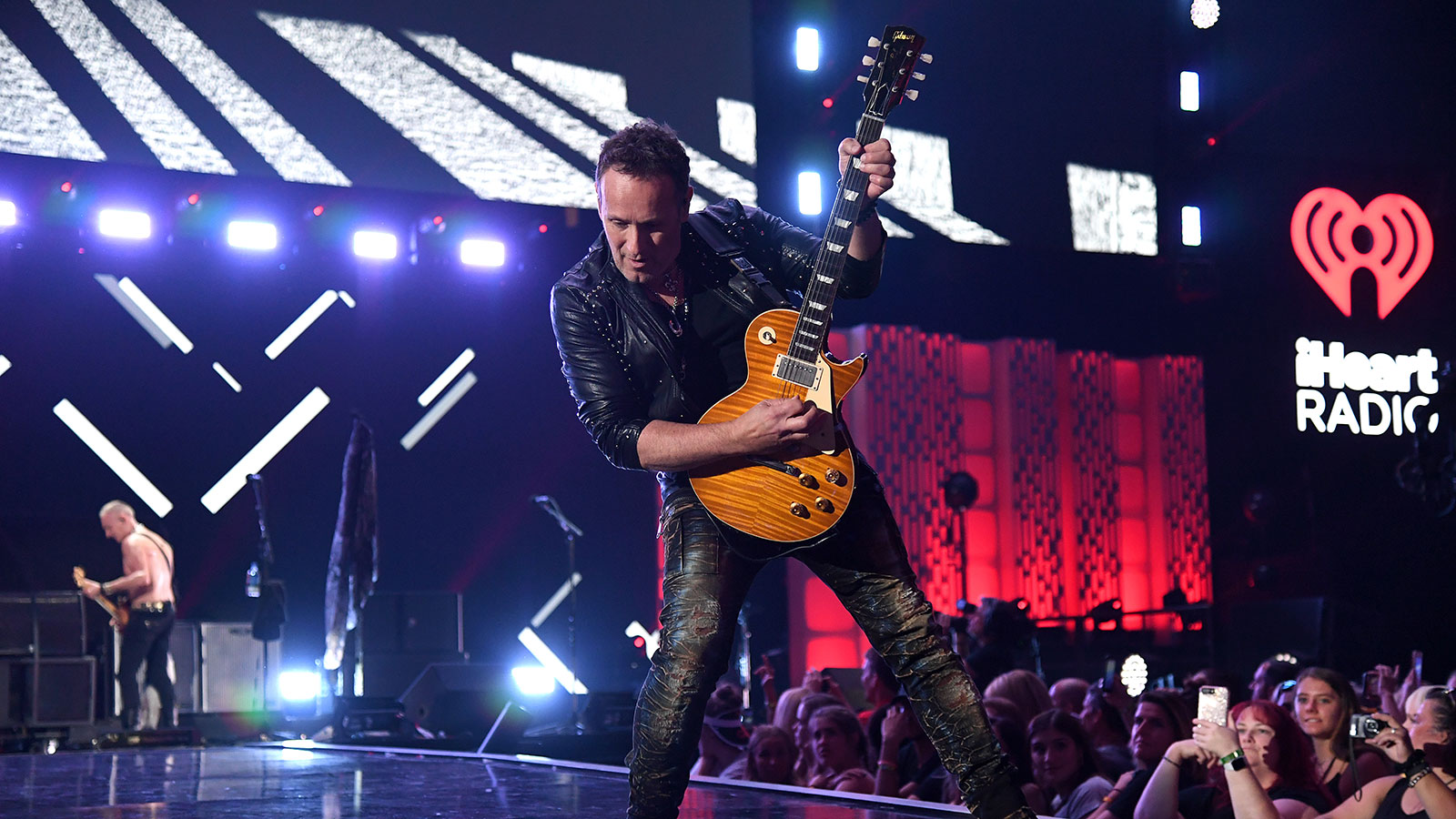
Viv, how about you?
Campbell: “Mostly Les Pauls. I used my Gibson Custom Shop Les Paul and my original Dio “Holy Diver” Les Paul. I also used a ’66 Telecaster. It’s been refretted with jumbo frets so I can actually bend on it. And I used my original Tom Anderson Strat for when I needed some shimmer or a little front pickup action. Those were the four that I used.”
Last question: Do you ever turn on the radio and hear one of your songs – maybe a big hit – and you think, “Man, I wish I could do it over. There’s something about it that’s not right”?
It was the Eighties and I was wearing spandex; you cringe and go, ‘Oh, my God. That’s so embarrassing.’ On the other hand, that was then and it was really cool
Phil Collen
Collen: ”Yeah, but the thing is, every song is a reference point, and you grow from it. Maybe there’s something on the track that’s a little naïve from a guitar playing standpoint, or lyrically there’s something that makes you cringe. But you get past it and move on.
“It’s like, one time the crew brought me a video of me playing with my old group Girl on The Old Grey Whistle Test. It was the Eighties and I was wearing spandex; you cringe and go, ‘Oh, my God. That’s so embarrassing.’ On the other hand, that was then and it was really cool.”
Campbell: “I used to get that, but you have to remember everything is a snapshot in time. You hear a song and it’s what happened in the studio that day. It’s pretty amazing, these little throwbacks. It’s like looking in a diary.”
- Diamond Star Halos is out now via UMe.
Joe is a freelance journalist who has, over the past few decades, interviewed hundreds of guitarists for Guitar World, Guitar Player, MusicRadar and Classic Rock. He is also a former editor of Guitar World, contributing writer for Guitar Aficionado and VP of A&R for Island Records. He’s an enthusiastic guitarist, but he’s nowhere near the likes of the people he interviews. Surprisingly, his skills are more suited to the drums. If you need a drummer for your Beatles tribute band, look him up.
“A virtuoso beyond virtuosos”: Matteo Mancuso has become one of the hottest guitar talents on the planet – now he’s finally announced his first headline US tour
“His songs are timeless, you can’t tell if they were written in the 1400s or now”: Michael Hurley, guitarist and singer/songwriter known as the ‘Godfather of freak folk,’ dies at 83















